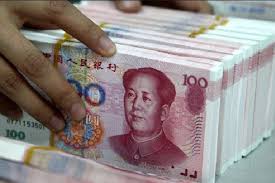
*Plus report on post-implementation control measures
By BASHIR ADEFAKA
The Nigerian economy’s continued nosediving has reached a point that the lower chamber of the nation’s parliament, the House of Representatives, has asked its government to implement the policy adopted and already signed with Beijing by the Muhammadu Buhari administration in 2018, which recognises the Chinese Yuan as an official foreign currency for conducting business transactions in Nigeria.

The DEFENDER recalls that then President Muhammadu Buhari’s intention was that, since majority of items Nigeria’s international traders seek dollar for are produced by and in China and the producer is also a world economic giant with its currency as stable and strong as dollar, there would thenceforth not be the need to go to United States to pay in dollar for products that traders would eventually go to pick up in China.
For this reason, Buhari signed the Yuan-Naira foreign exchange policy with President Xi Jinping but, unfortunately since then, not only the easier way intended by the government to save the Nigerian Naira from the slaughter slab of American dollar has been unimplemented, the monopoly of forex that sees the dollar as foreign trade path way for Nigerian importers has continued to endanger the nation’s once-upon-a-time master currency to the dollar until early 1980s.
To now curb the continuous depreciation of the Naira as a sure way of saving the Nigerian economy from further decline, seeing that no economy can survive at foreign exchange rate of N1,160 or more to $1 considering Nigeria as sadly an import dependent economy – African giant though, the House of Representatives, on Thursday December 21, 2023, asked the Bola Ahmed Tinubu-led administration to go ahead and implement the Chinese Yuan policy signed since 2018 even as many Nigerians are favouring the need for the government to be serious about doing so.
The House had asked its committees on Banking Regulations, Banking, and Other Ancillary Institutions to liaise with the Central Bank of Nigeria (CBN) to explore the appropriate mechanisms, policies and partnerships required for giving effect to the policy.
Adopting a motion sponsored by Hon. Jafaru Gambo Leko, the House said considering the volume of trade between Nigeria and China, the Chinese currency should serve as an official foreign exchange reserve currency alongside other major international currencies.
Hon. Leko said the Nigerian economy has experienced substantial shifts regarding the value of the Naira, triggering economic instability and uncertainty.
According to him, the International Monetary Fund (IMF) proposed diversification of foreign exchange reserves for central banks of developing countries, including Nigeria.
Hon. Leko said the global economic landscape is evolving and international trade dynamics are shifting, with China assuming a leading role in global trade.
He said the People’s Republic of China has a stable and globally recognized currency, the Chinese Yuan (CNY), which is gaining recognition in international trade.
He said adopting the Chinese Yuan as an additional foreign exchange reserve currency might mitigate the adverse effects of Naira depreciation, reduce the risks associated with exchange rate fluctuations, and enhance Nigeria’s economic stability.
He argued that doing so would enhance Nigeria’s trade and economic ties with China, a crucial trading partner.
House Leader, Hon. Julius Ihonvbare, informed the House that the use of the Yuan was adopted as a policy by the government after the collapse of the price of crude oil in the international market, pointing out that what should be done is to implement the policy.
On his part, Hon. Sada Soli applauded the motion.
However, The DEFENDER reports that although China, like Russia, has been a development partner with no insincerity of purpose dealing with Nigeria, political will must be asserted to ensure control measures for effective gains of the Naira-Yuan foreign exchange when adopted.
With oil alone that Nigeria produces, the country should be well on ground internationally to negotiate for the strengthening of its Naira while, from the foreign land, it should be bold enough to insist on technology transfer that, like China, makes holding a spanner a taboo for any supplier of foreign made equipment at installation, service and maintenance level, it has been said.
Moreover, we gathered, the country is also blessed with agricultural produces especially in Northern path of the country with some cash crops in South West like cashew nuts and cocoa still being exported across the shores of the country all of which should now be holistically deployed by the country as products for generating foreign exchange, enough to provide stability for its Naira in the international market.
Without these measures, including control at the local level, those who hoard hard currency to hold importers in need to tight corners in order to speculate exchange rate will still make it a woe, our investigation revealed.









